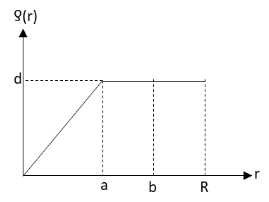Question
Question: A nuclear charge (Ze) is non-uniformly distributed within a nucleus of radius \[R\]. The charge dens...
A nuclear charge (Ze) is non-uniformly distributed within a nucleus of radius R. The charge density ρ(r) [charge per unit volume] is dependent on the radial distance from the centre of the nucleus as shown in figure. Select correct alternative/s.

A. Electric potential at r=R is independent of b
B. Electric potential at r=R is proportional to b
C. Electric field at r=R is proportional to a
D. Electric potential at r=R is proportional to a
Solution
Use the formulae for the electric field and electric potential at a point inside a nucleus in which the charge is not distributed uniformly. From these two formulae, derive the relation between the electric field and electric potential at a point inside the nucleus and check which of the statements given in the options are correct.
Complete answer:
We have given that the charge in the nucleus is non-uniformly distributed and the radius of the nucleus is R.The charge density of the nucleus depends on the distance of the charge from the centre of the nucleus.The graph of variation of the charge density with the distance from the centre of the nucleus is given in the question.
The electric field E(r) at any point inside the nucleus is given by
E(r)=4πε01R3Qr …… (1)
Here, ε0 is the permittivity of free space, Q is the charge, r is the distance from the centre of the nucleus and R is radius of the nucleus.
The electric potential V(r) at a point due to charge is given by
V(r)=4πε01rQ …… (2)
Here, ε0 is the permittivity of free space and r is the distance from the centre of the nucleus.
From equations (1) and (2), we can see that the electric field and electric potential at any point inside the nucleus depends on the distance r of that point from the centre of the nucleus.The electric potential at a point r=R is inversely proportional to the R. Thus, the electric potential at r=R is independent of b. Also the electric potential at is not proportional to a and b.Hence, the statement given in option A is correct and the statements given in options B and D are incorrect.The electric field at a point r=R is proportional to R and not to a.Hence, the statement given in option C is incorrect.
Hence, the correct option is A.
Note: The students should be careful while using the formula for the electric field and electric potential at a point inside the nucleus because the students may assume that these two physical quantities electric field and electric potential are the same. But these two are different physical quantities with different formulae.
